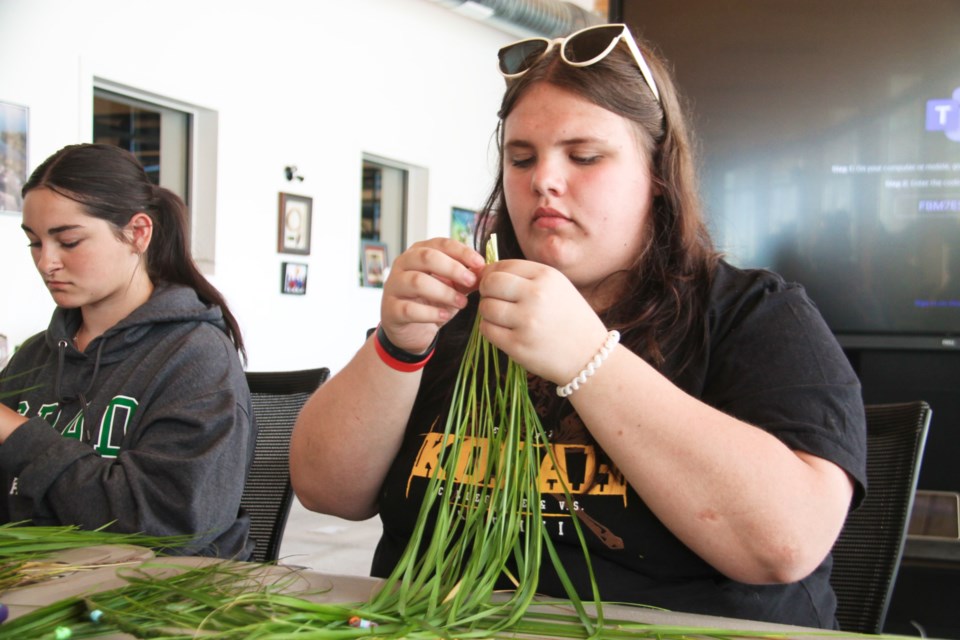Like so many other teens, Ella May Kidder found high school difficult at first.
“For me, going into Grade 9 was the biggest struggle of my life. I was going from a small elementary school classroom to a big school. I had so many struggles but I got back up on my feet. In Grade 10 it got easier and I felt more settled,” the 15-year-old Goulais River resident said in a conversation with SooToday Friday.
Now, heading into Grade 11 at Korah Collegiate in September, Kidder is not only feeling more settled but is also one of five Indigenous Algoma District School Board secondary school students mentoring Indigenous ADSB Grade 8 graduates preparing for their own leap to Grade 9 this fall.
Shingwauk Kinoomaage Gamig (SKG) is the location for the ADSB’s annual Indigenous Summer Transition Camp for the second year in a row.
Indigenous Grade 8 graduates who attend the camp earn one credit toward their high school diploma.
High school mentors such as Kidder are joining the Grade 8 grads in hands-on Indigenous learning, answering their often nervous pre-high school questions and letting them know they’ll be there for them as they enter the doors of high school in September.
“All my experiences of learning and getting to know the Grade 8 kids is fun. I’ve always thought of being a teacher. I like being in classrooms and getting to know other people so this gives me an opportunity to do something that I think is cool,” Kidder said.
“It’s teaching them about high school life, about having fun and it’s a great opportunity for them to understand what they’re going into, what supports are available for them in high school and what they can do for their career paths.”
Kidder identifies as Indigenous and Metis and is a member of Thessalon First Nation.
“We have been teaching the students about respect. We’ve been going through the Seven Grandfather Teachings. We’ve been teaching them about self respect and respect for others. It’s teaching them to have a fun summer while learning Indigenous activities and finding their interests. It feels amazing. I was very shy but now that I’m out of my bubble I’m speaking more with them. It’s so amazing to see other kids smile,” Kidder said.
The Indigenous Summer Transition Camp based out of SKG has so far included field trips and hands-on activities such as strawberry picking at Goulais River’s Fiddlehead Farm, visiting Garden River First Nation community sites such as the Dan Pine Healing Lodge and a canoe trip down the St. Marys River.
This year’s camp began July 4 and continues to July 26, each of the in-class school days beginning at 9 a.m. and finishing at 3 p.m.
27 students are registered, monitored by four ADSB teachers, Indigenous grad coaches and the five high school student mentors.
“I like it. I liked canoeing, the strawberry picking, the sweetgrass, everything we’ve done. I’ve learned there are a lot of different opportunities for Ojibway in high school,” said Olivia Orozco, a Metis Grade 8 graduate of Pinewood Public School starting Grade 9 at White Pines Collegiate in September.
“It’s a really good experience,” said Faith Parr, an Indigenous graduate of Korah Collegiate’s Grade 8 program heading into Grade 9 at that school in the fall.
“I really enjoyed the canoeing. I really like stick painting and rock painting and I’m looking forward to doing beading. It’s good to learn about my culture. My family has never told me anything about my culture except for my Native name. I’ve learned about our Chiefs, the past and what they had to go through,” Parr said.
Students learned how to braid sweetgrass Friday.
“It’s one of our forms of medicine,” said Alyssa Traves, ADSB Indigenous Education Lead.
“It can be burned as a cleansing medicine, or braided sweetgrass can be a form of protection. You’ll see people who have sweetgrass in their homes or hanging on the rear view mirror. Sweetgrass on the dash is a way of protecting us,” Traves said.
“They’re taking a leadership role in showing the other kids what high school may be,” Traves said of the Indigenous Summer Transition Camp high school mentors such as Kidder.
“As adults, as teachers, we can tell you a lot of things you need to know about high school but it’s better to have someone speak to you who’s experiencing it as a high school student.”
“Having SKG as this year’s host gives us a lot of flexibility to be able to do a lot of cultural activities. It’s storytelling, painting, music, drums, doing some active work out in the garden. For a lot of the kids it doesn't even feel like summer school,” Traves said.
“Seeing SKG and our community partners hosting us, seeing Garden River, Batchewana, Urban Indigenous people coming in to teach and providing these experiences makes me really proud, having our community step up for these kids to show them that they’re important.”
